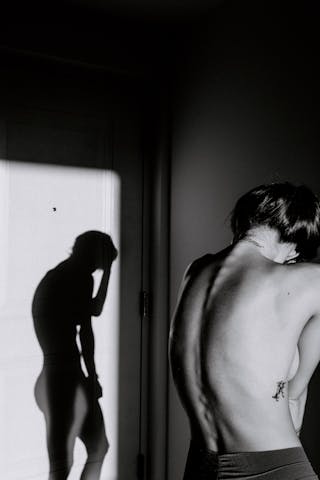The release of the new Wonder Woman poster has sparked a wave of speculation among fans, with many wondering if the iconic superhero may be gay or bisexual. The poster, which features Gal Gadot as the titular character, shows Wonder Woman standing confidently with her arms crossed, a steely look in her eyes, and a rainbow-colored background. This has led some fans to believe that the character may be coming out as part of the LGBTQ+ community.
Have you ever wondered about the inner thoughts and desires of your favorite superhero? It seems that Wonder Woman's complex and multifaceted character has sparked some interesting conversations among fans. As the debate rages on, one thing is for certain - everyone has their own interpretation of her sexuality and it's causing quite the stir. If you're curious to explore your own fantasies, check out this exciting offer and see where your imagination takes you.
The speculation has been fueled by a number of factors, including Wonder Woman's close relationships with women in the comics and her lack of a romantic interest in the recent films. Additionally, the use of the rainbow colors in the poster is often associated with the LGBTQ+ community, leading many to believe that this may be a deliberate hint at Wonder Woman's sexual orientation.
If you're looking to add some excitement to your sex life, why not try out some spanking sex games at LusciousSex.com?
The debate has sparked a range of reactions from fans, with some expressing excitement at the possibility of seeing a queer superhero on the big screen, while others have raised concerns about the potential backlash from more conservative audiences. Regardless of the outcome, the conversation around Wonder Woman's sexuality has shed light on the importance of LGBTQ+ representation in mainstream media, and the impact it can have on audiences.
If you're looking for an unforgettable experience, why not explore the exciting world of New York City escorts at Luscious Sex and see what all the buzz is about.
Representation in Mainstream Media
Explore some naughty chat options for a fun and exciting experience.
The debate around Wonder Woman's sexual orientation speaks to the larger issue of LGBTQ+ representation in mainstream media. While there have been significant strides in recent years, with the inclusion of queer characters in popular films and TV shows, there is still a long way to go in terms of accurate and meaningful representation.
For many LGBTQ+ individuals, seeing themselves reflected in the media is crucial for validation and acceptance. This is particularly true for young people who may be struggling with their own identity and looking for positive role models. By including queer characters in mainstream media, it sends a powerful message that LGBTQ+ individuals are valued and worthy of representation.
Furthermore, representation in media can also help to challenge harmful stereotypes and misconceptions about the LGBTQ+ community. By portraying queer characters as complex and multifaceted individuals, it can help to break down barriers and foster greater understanding and empathy among audiences.
The Impact of LGBTQ+ Representation
The impact of LGBTQ+ representation in media goes beyond simple visibility. Research has shown that exposure to diverse and inclusive media can have a range of positive effects on individuals, including increased feelings of self-worth and belonging, as well as greater acceptance of others.
For LGBTQ+ individuals, seeing themselves represented in the media can be a source of empowerment and validation. It can help to combat feelings of isolation and alienation, and provide a sense of community and belonging. This is particularly important for young people who may be struggling with their sexual orientation or gender identity, and are looking for positive role models to look up to.
Additionally, LGBTQ+ representation in media can also have a broader impact on society as a whole. By normalizing queer identities and relationships, it can help to challenge heteronormative standards and foster greater acceptance and understanding of the LGBTQ+ community.
The Future of LGBTQ+ Representation in Media
The debate around Wonder Woman's sexual orientation is just one example of the ongoing conversation around LGBTQ+ representation in media. As audiences continue to push for more diverse and inclusive storytelling, it's likely that we will see an increase in queer characters and storylines in popular films and TV shows.
However, it's important to note that representation is not just about including queer characters for the sake of it. It's about telling authentic and meaningful stories that reflect the diverse experiences of the LGBTQ+ community. This means hiring queer writers, directors, and actors to bring these stories to life, and ensuring that they are treated with the same respect and care as any other character.
Ultimately, the debate around Wonder Woman's sexual orientation serves as a reminder of the power of representation in media, and the impact it can have on individuals and society as a whole. As we continue to push for greater diversity and inclusion in storytelling, it's important to remember the importance of authentic and meaningful representation for all marginalized communities.
- https://find-a-girlfriend.getweps.com/posts/wand-vibrators-best-sex-wands/
- https://online-personals.fu-direct.net/posts/my-best-sex-ever-was-in-the-staff-room/
- https://sex-guide.timebombrecordings.com/posts/i-didnt-know-abusive-samesex-relationships-existed-until-i-was-in-one/
- https://meet-women.thehottieandthenottie.com/posts/
- https://hookupsites.timebombrecordings.com/posts/best-girl-on-top-sex-positions-woman-on-top-sex-positions/
- https://dating-for-free.ua-sex.com/posts/how-to-prepare-for-anal-sex/
- https://online-hookup.thehottieandthenottie.com/posts/how-to-do-the-corkscrew-position-a-sex-expert-explains/
- https://local-personals.thehottieandthenottie.com/posts/a-guide-to-trans-sex-how-to-have-sex-as-a-trans-person/
- https://location-dating.ua-sex.com/posts/sex-at-work-sex-with-boss-stories/
- https://flirting-online.timebombrecordings.com/posts/my-best-sex-ever-was-with-my-exs-best-friend/
- https://location-dating.ua-sex.com/posts/10-women-on-the-one-thing-they-wish-they-knew-before-they-had-anal-sex/
- https://online-sex.getweps.com/posts/lesbian-erotica16-best-lesbian-and-samesex-erotic-novels/
- https://dating-for-free.ua-sex.com/posts/how-to-sext-sexting-tips-for-sexting-your-partner/
- https://online-hookup.thehottieandthenottie.com/posts/sexual-inexperience-men-on-makes-women-experienced-in-bed/
